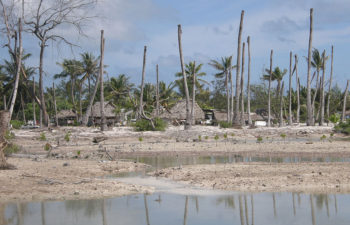Timo Leiter

Timo is the winner of the ESRC Celebrating Impact Prize 2024, in the early career category, for the policy impacts that resulted from research and engagement with policy makers during his ESRC-funded PhD (2018-2023). Timo’s impact at the UN climate change negotiations and on national adaptation planning is summarised in this impact case and in the video below.
Dr Timo Leiter is a global thought leader on climate change adaptation working at the intersection between research, policy and implementation. At the global level, Timo has been participating in the UN climate change negotiations since 2015. In 2022 and 2023, he co-facilitated the workshop series under the work programme on the Global Goal on Adaptation that led to the adoption of the first set of global adaptation targets at COP28 that all countries agreed to implement by 2030. Timo’s research directly underpins one of the targets, that all countries are to establish monitoring and evaluation systems for the implementation of their national adaptation plans. Currently, Timo co-leads the expert group, mandated by the Chairs of the Subsidiary Bodies of the UNFCCC, to develop indicators for the four targets related to the adaptation policy cycle.
Timo is well known for his contributions to monitoring and evaluation of adaptation to climate change (see GoogleScholar and ResearchGate for a complete list of his publications). Timo co-designed the assessment framework of UNEP’s Adaptation Gap Report which resulted in the first comprehensive global assessment of adaptation planning, finance and implementation. Since 2020, Timo has been leading its chapter on global progress on implementation with a diverse international author team. The Adaptation Gap Report is endorsed by the UN Secretary General and is regularly cited in COP decisions. Timo is also a contributing author to the IPCC Sixth Assessment Report, Working Group II where he authored the sections on adaptation monitoring and evaluation.
At the national level, Timo has been advising several governments on the development of useful systems to monitor the implementation of their national adaptation plans. The importance of this work is underscored by Timo’s research which found that over 60% of countries that adopted a National Adaptation Plan do not track its implementation. In the UK, Timo has been advising the Department for Environment, Food and Rural Affairs (Defra) on the development of a monitoring and evaluation framework and indicators for England’s Third National Adaptation Programme.
Timo holds a PhD in climate change adaptation, environmental policy and development from LSE for which he was awarded a scholarship from the UK Economic and Social Research Council (ESRC). He graduated as best of his cohort in the degree programme in economics and business studies (Diplom-Ökonom) at the University of Oldenburg, Germany, and holds a Master’s degree with High Distinction from Bond University, Queensland, Australia. Timo is a Fellow of the Royal Society of Arts (FRSA).
Background
Between 2011 and 2019, Timo worked at Germany’s state-owned agency for international development (Deutsche Gesellschaft für Internationale Zusammenarbeit, GIZ) in several projects on adaptation and climate finance. Part of his position was to advice the climate policy units of Germany’s Federal Ministry for Economic Cooperation and Development (BMZ) and of South Africa’s Department of Environmental Affairs (DEA). For two years he was based in Dar es Salaam, Tanzania, where he led GIZ’s support to the Tanzanian government for the National Adaptation Plan process and was responsible for the delivery of climate adaptation, capacity building and climate finance readiness activities. As part of this support, Tanzania updated its NDC and prioritised concept notes for adaptation projects that were approved and implemented under the Adaptation Fund.
Timo authored or co-authored several practical guides and training courses, including:
- A guidebook for the development of national adaptation M&E systems (2015) in collaboration with the Adaptation Committee and the LDC Expert Group
- The Adaptation M&E Navigator (2017) to match M&E purposes with suitable methods and approaches
- A training course on adaptation monitoring and evaluation (2016)
- The guidebook “Adaptation made to measure” (2012/2013), one of the pioneering guides for the design of climate adaptation projects and results-based monitoring systems
Timo serves as reviewer for leading journals including Science, Nature Climate Change, Nature Communications, Climate Policy, Climate & Development, Climate Risk Management, Mitigation and Adaptation Strategies for Global Change, Environmental Policy and Governance, Journal of Institutional Economics, Carbon & Climate Law Review; and Weather, Climate & Society.
Research interests
- Climate change adaptation
- Climate policy (global climate change negotiations)
- Monitoring and evaluation
- Global environmental governance
- International development
Research
Research - 2024
This invited editorial outlines the importance of the framework for the global goal on adaptation that was adopted at COP28 in December 2023, and its implications for international law. Read more

Research - 2023
The author of this paper outlines five aspects to guide future research on NDCs as a governance instrument including the crucial distinction between exploring potential NDC functions based on submissions during the negotiation process and examining the actual NDC functions based on the adopted Paris rulebook and empirical observations. Read more

This book chapter provides practical guidance on conducting fieldwork at international environmental conferences by drawing on the experiences of four advanced or recently completed PhD research projects: two on the climate change negotiations and two on biodiversity beyond national jurisdictions. Read more

Research - 2022
This article proposes a framework for tracking negotiation outcomes on adaptation based on the four dimensions of the Adaptation Gap Report of the United Nations Environment Programme (planning, finance, implementation, and effectiveness) and on key governance functions outlined in the climate policy literature. Read more

This cross-chapter box of the IPCC Sixth Assessment Report, Working Group II on Impacts, Adaptation and Vulnerability, outlines approaches and challenges of assessing progress in climate change adaptation globally. Read more

This section in the IPCC's Sixth Assessment Report, Working Group II on Impacts, Adaptation and Vulnerability synthesizes the state of knowledge on monitoring and evaluation (M&E) of adaptation to climate change. Read more

Contributors to this paper discuss the implications of the post-Glasgow climate ‘pact’ for the continued relevance of evaluation. Read more

Research - 2021
This perspective identifies how recent advances contribute to re-evaluating and re-constructing global environmental negotiations as a research object by calling into question who constitutes an actor and what constitutes a site of agreement formation. Read more

This synthesis of 1,682 articles presents a systematic and comprehensive global stocktake of implemented human adaptation to climate change. Read more

This study finds that more than 60% of countries that adopted a national adaptation plan (NAP) are not tracking its implementation. Read more

Research - 2019
This background paper published by the Global Commission on Adaptation provides a comprehensive overview of the current landscape of climate adaptation metrics. Read more

Research - 2018
The article first examines distinct characteristics of climate change adaptation and mitigation and the implications for measuring progress in these two interrelated policy domains. Read more

Policy
Policy - 2024
UNEP’s Adaptation Gap Report (AGR) provides a detailed account of adaptation planning, finance and implementation. Read more
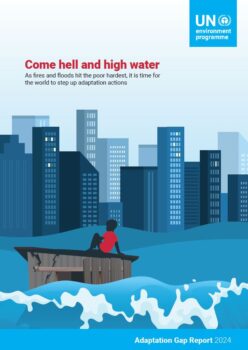
This toolkit provides practical guidance for developing and continuously improving monitoring, evaluation, and learning systems for National Adaptation Plan processes. Read more
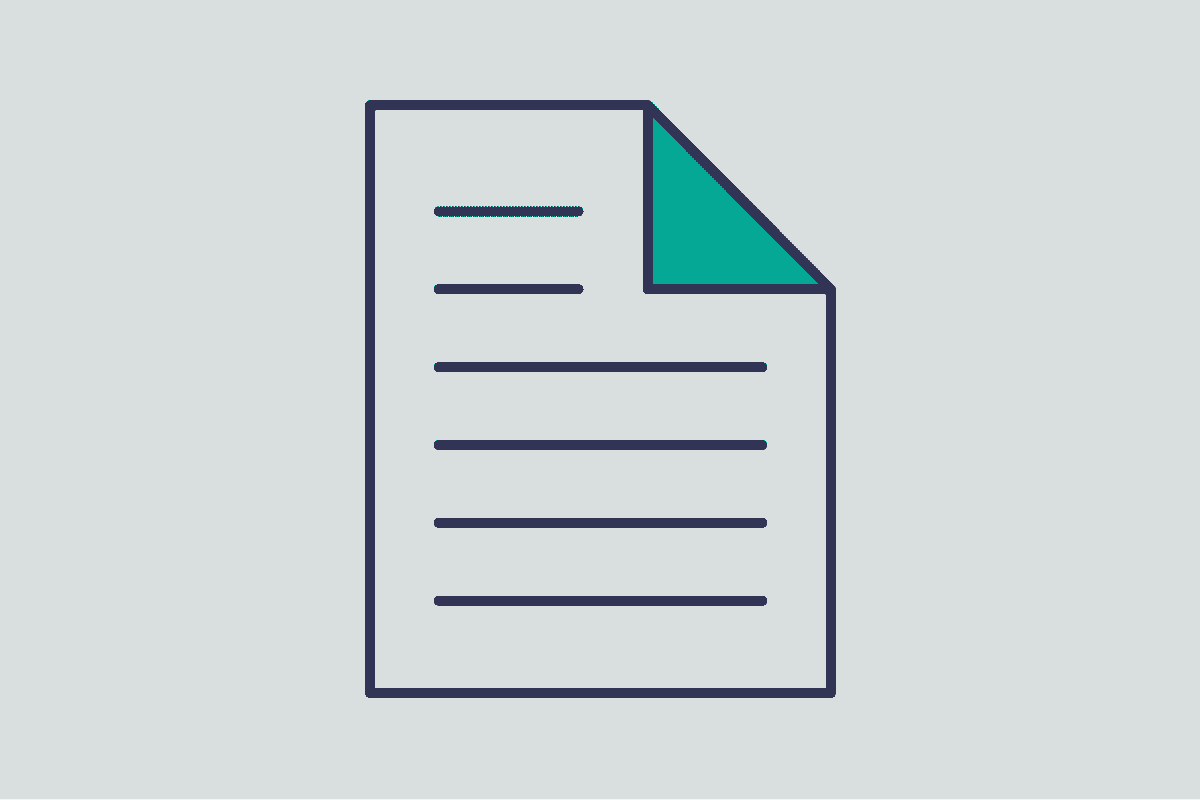
A submission to the consultation process on how the Indicator Work Programme under the Global Goal on Adaptation will conduct its work. Read more

Policy - 2023
Where do we stand globally on adaptation? One of UNEP’s annual flagship reports, the Adaptation Gap Report provides a detailed account and... Read more
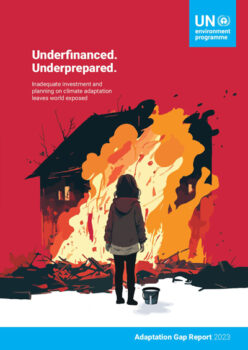
This is a submission to a call from the Standing Committee on Finance for information and data to inform the preparation of a report on the doubling of adaptation finance. Read more

To support the process of adopting a framework for the Global Goal on Adaptation at COP28, this submission outlines key aspects that need to be addressed in its development. Read more
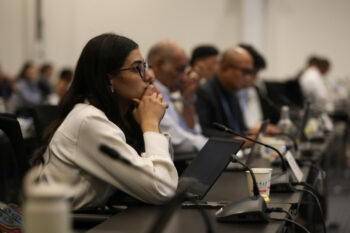
Policy - 2022
The Adaptation Gap Report 2022, published by the UN Environment Programme, looks at progress in planning, financing and implementing adaptation actions. Read more
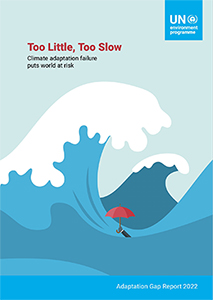
This paper provides guidance on key elements of a robust M&E system and identifies nine best practices for Canada to guide its development. Read more

Policy - 2021
This report, published by the UN Environment Programme, finds that there is an urgent need to step up climate adaptation finance. Estimated adaptation costs in developing countries are five to ten times greater than current public adaptation finance flows, and the adaptation finance gap is widening. Read more

This chapter of UNEP's Adaptation Gap Report 2020 looks at available evidence of implementation of climate change adaptation globally. Read more

Policy - 2020
This report reviews the indicators included in Grenada’s National Adaptation Plan, especially their measurability and completeness regarding the goals of the NAP, and proposes options for improvement. Read more

Books
Books - 2023
This book chapter provides practical guidance on conducting fieldwork at international environmental conferences by drawing on the experiences of four advanced or recently completed PhD research projects: two on the climate change negotiations and two on biodiversity beyond national jurisdictions. Read more

Events
Events - 2024
News
News - 2025
Researchers from the Grantham Research Institute gained recognition in two out of six categories for LSE’s Impact Prize at an event held on 25 June 2025. Read more
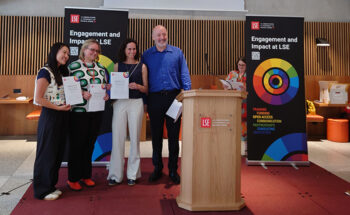
This article reports on efforts by UN climate negotiators in Bonn to agree on a common set of indicators to measure how well the world is adapting to the impacts of climate change. Read more

This article considers how the BRICS group of countries (Brazil, Russia, India, China and South Africa) could take on a greater climate leadership role particularly in the light of the United States withdrawal from international climate action efforts. Read more

This news article reports on apparent absence of US officials from international climate forums, such as the UNFCCC and IPCC, since Donald Trump started his second term as president. Read more

President Trump’s orders to leave the Paris Agreement and “terminate the Green New Deal” will have far-reaching implications for climate governance and action in the United States and globally, but giving up is not an option, writes Timo Leiter. Read more

News - 2024
Distinguished Policy Fellow, Dr Timo Leiter has been awarded the Economic and Social Research Council's Celebrating Impact Prize 2024 in the Outstanding Early Career Impact category. Read more

Timo was shortlisted for his project Better prepared: new global targets strengthen climate adaptation and resilience. Read more
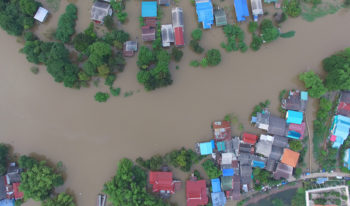
This article discusses the principle of “common but differentiated responsibilities” particularly in relation to climate financing for developing nations and... Read more

In this guest article Dr Portia Adade Williams, Dr Luckson Zvobgo, Dr Timo Leiter and Dr Christopher Trisos look at a series of key considerations for developing effective indicators that track progress on adaptation. Read more

News - 2023
Timo Leiter, a co-facilitator of the GGA workshops, explains the 10 most common misconceptions about the global goal on adaptation and its framework, to provide clarity for discussions and reporting from COP28. Read more
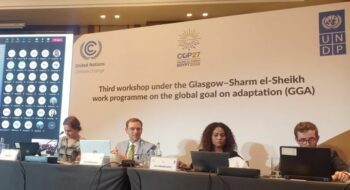
This episode of the Climate Discourse podcast, produced by Climate and Carbon Law Review (CCLR) features Timo Leiter discussing his recent CCLR article, ‘Too Little, Too Slow? Climate Adaptation at the United Nations Climate Change Negotiations Since the Adoption of the Paris Agreemen Read more

News - 2022
This news article considers the cost (per ton of CO2)of climate impacts, demands from developing countries for compensation, and the... Read more

In this radio interview Timo Leiter discusses expectations of COP27 and progress made since the last COP hosted by the UK in Glasgow. Read more

News - 2021
In this article Timo Leiter responds to South Africa’s proposal for a quantitative target for boosting resilience to climate impacts. He says that the proposal faces both technical and political challenges. Read more

Climate policy has long been relegated to the sidelines in Tanzania. The late President's vision for economic growth can be achieved only if his successor puts Tanzania on a climate-resilient development pathway, argues Timo Leiter. Read more
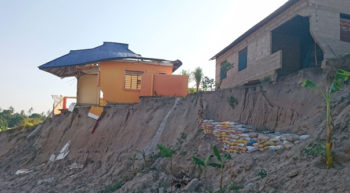
Timo Leiter, a lead author on UNEP’s latest Adaptation Gap Report, explains why simplistic metrics are not meaningful in understanding global progress on adaptation and how this is being improved. Read more
